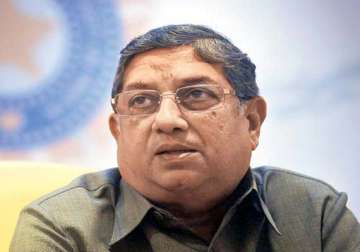PIL challenging BCCI amendments "favouring "Srinivasan junked
Mumbai: The Bombay High Court today dismissed a petition filed by the Cricket Association of Bihar (CAB) chief challenging two amendments brought out by BCCI in its rules allegedly to favour its President-in-exile N Srinivasan.The

Mumbai: The Bombay High Court today dismissed a petition filed by the Cricket Association of Bihar (CAB) chief challenging two amendments brought out by BCCI in its rules allegedly to favour its President-in-exile N Srinivasan.
The HC ruling on the petition, filed by CAB chief Aditya Varma, could pave the way for Srinivasan to contest another term as Cricket Board President during elections in Chennai on November 20.
A Division Bench headed by Justice Anoop Mohota refused to interfere with the decision of the BCCI's general body in carrying out the amendments in its rules, saying the plea was based on presumptions and assumptions which cannot be considered by the court in a Public Interest Litigation. The Bench maintained the petitioner was a third party and not part of BCCI. Moreover, he was making allegations which were based not on his personal knowledge but on presumptions and assumptions which cannot be considered by the court.
The PIL had challenged an amendment to Clause 15 of BCCI's rules whereby the Zone-wise rotational policy of nominating Board President was revised. According to the original rule, each Zone was to elect BCCI President by rotation, but the amendment provided that a Zone can nominate a person for the top post from outside its jurisdiction. The petition alleged this rule was amended to allegedly favour the veteran cricket administrator. The PIL also questioned the change to regulation 6.2.4 which says except for Indian Premier League (IPL) and Champions League Twenty20, no administrator, officer, player or umpire shall have any direct or indirect commercial interest in matches or events conducted by the Board. The petition alleged that IPL and Champions League T20 were deliberately left out in the amendment with a view to benefit Srinivasan.
However, the High Court was of the view that there was no need to interfere with the amendments carried out by BCCI, particularly as they were done in conformity with the laid down procedure and rules. Hence, the Bench declined to strike down these changes in the Board's rules.
The PIL alleged that only after amendment to rule 6.2.4 was carried out, Srinivasan became eligible to own IPL team Chennai Super Kings.
The petition alleged there was a conflict of interest as Srinivasan was the owner of an IPL franchise and also responsible for selecting the national team in his capacity as BCCI President.
Hence, he could allegedly influence the selection of the team, the petitioner's counsel Birendra Saraf argued.
“If a body amends a rule to perpetuate an illegality, should the court permit this to happen?” Saraf asked and said the Cricket Board has to act fairly and not arbitrarily.
Saraf alleged the rules were amended not to serve the interests of the game of cricket in India but to sub-serve the personal interest of an individual.
BCCI counsel Iqbal Chhagla argued that the petition was misconceived and baseless and should be dismissed. He submitted that Varma had filed a similar petition before the High Court earlier which was disposed of by a bench. He had not disclosed this information to the Court.
Chhagla argued that Srinivasan was not involved in selection of the national team, a job which has been assigned to a sub-committee. This sub-committee was independent and appointed by the general body of Cricket Board.
As BCCI President does not select the team, there was no conflict of interest as alleged in the petition, he said.
Both amendments were passed unanimously at BCCI's general body and therefore were not arbitrary or illegal. Also, there are judgements to show that the courts should not interfere in the internal matters of companies or public organisations, the Cricket Board Counsel maintained.
The High Court opined that it would not interfere with the unanimous decisions taken by BCCI's general body after following the due process.